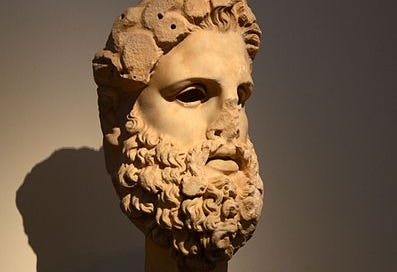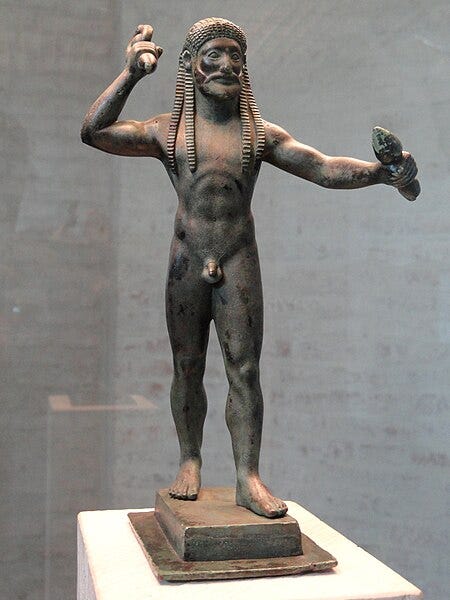This post is a basic introduction to reading Iliad 15. Here is a link to the overview of book 14 and another to the plan in general. As a reminder, these posts will remain free, but there is an option to be a financial supporter. All proceeds from the substack are donated to classics adjacent non-profits on a monthly basis.
Book 15 is one of those books that makes it hard to imagine the Iliad being constructed entirely out of shorter, more-or-less self-contained songs, insofar as it relies so much on the action of book 14. And yet, one could also imagine the action following the seduction of Zeus following in many different directions. Book 15 offers an opportunity for Zeus to reestablish his authority over the gods and get his ‘plan’ back on track.
The action of the book is split into two basic movements: Zeus’ conversations with the gods to threaten or cajole them and the resulting actions taken to rally the Achaeans. Accordingly, the plot of this book engages critically with the major themes I have noted to follow in reading the Iliad: (1) Politics, (2) Heroism; (3) Gods and Humans; (4) Family & Friends; (5) Narrative Traditions, but the central themes I emphasize in reading and teaching book 13 are Politics, Gods and Humans and Narrative Traditions.
Divine Politics
As I have discussed in earlier posts, Zeus exercises control over the plot and the pacing of the epic. But scenes on the divine plane also have significant impact on the Iliad’s investigation of politics. One of my hobby-horses in the Iliad since I wrote my dissertation, has been what I call the three-stages for the investigation of how language and politics help communities face threats to their safety. While many have written about the political situation among the Achaeans, fewer have written on the Trojans and even fewer have seen the gods as a locus for political concerns.
I think how the gods negotiate their decisions and power struggles helps us to understand the Trojans and Greeks better. In short, the gods have a family-based autocracy that functions in perpetuity because Zeus’ power cannot be contested in any reasonable sense. While there are stories of Zeus’ authority undermined through apostasy or war, all of those stories are projected into the Iliad’s past. What is significant is that Zeus does not actually use his physical power in the Iliad: he makes threats (see books 4, 5, 8 and 16) but he mainly relies upon the idea of his power. Book 15 is a great demonstration of this because rather than harming Hera or engage with Poseidon directly, Zeus sends a messenger to converse with Poseidon and delegates resetting the battlefield to Apollo. In practice, Zeus’ leadership of the gods contrasts most directly with the Trojans who have a similar political structure but lack both the actual immutable power to maintain it and the linguistic dexterity that would channel it.
I do not mean to blame the Trojans entirely, however. Instead, I think the Iliad points out that the way the gods govern themselves is an impossible model for human beings for two reasons: first, human power is never unassailable; second, humans are impermanent and mortal, along with all agreements and situations they create.
To understand this contrast with the gods, it is useful to turn to Hesiod’s Theogony to figure out why the gods no longer have succession issues. Hesiod’s Theogony, as Barbara Graziosi and Johannes Haubold describe it, works in partnership with the Homeric poems to describe to ancient audiences how their world came to be. One of the questions that these poems explain together is how the Olympian pantheon became established and why the worlds of gods and men are separate. Indeed, the Theogony states before it moves into its primary narrative that one of its goals is to recite “how the gods divided their wealth and doled our their honors” (112).
The story of the Theogony moves through three generations of conflict that pit various elemental forces against each other–gender, age and youth, strength and intelligence etc–and most of these tensions are resolved, or at least suspended, in the body of Zeus who eats his first wife Metis and gives birth to Athena, thus appropriating female powers, some portion of intelligence and more. But Zeus also gains power by acting trans-generationally. In Hesiod’s version of the Titanomachy, Zeus allies with the Hundred-Handers and the Kyklopes to overthrow the Titans and solidifies his ‘heroic’ stature by defeating the monster Typhoon.
But the key moment in the poems political establishment comes before Zeus eats Metis (after line 885). Once the battle with Typhoon is completed, the narrator tells us that the gods got down to the real business:
Hesiod, Theogony 881-885
Once the gods had finished their toil
and they had resolved the issues of honors with force,
then in fact at the advice of Gaia
they were urging broad-browed, Olympian Zeus to be king and rule
the immortals and then he made a good distribution of their honors.αὐτὰρ ἐπεί ῥα πόνον μάκαρες θεοὶ ἐξετέλεσσαν,
Τιτήνεσσι δὲ τιμάων κρίναντο βίηφι,
δή ῥα τότ’ ὤτρυνον βασιλευέμεν ἠδὲ ἀνάσσειν
Γαίης φραδμοσύνῃσιν ᾿Ολύμπιον εὐρύοπα Ζῆν
ἀθανάτων· ὁ δὲ τοῖσιν ἐὺ διεδάσσατο τιμάς.
The image of Zeus projected here is one of a king and an anax (cf. the Mycenaean word wanax) whose power resides not just in his ability to distribute honors, but in his power to maintain them and ensure them over time. Much of this is anticipated prior to the series of battles that occupy a good portion of the Theogony
Hesiod, Theogony 391-396
“[Zeus] called the immortal gods to great Olympos
And said that whoever fought with him against the Titans
Would not be deprived of rights (geraîon) but that each
Would possess the honor (timê) they had before among the immortals.
And he added that whoever was dishonored (atimos) and disenfranchised (agerastos)
Under Kronos, would received honor (timê) and rights (geraîon), as is correct [lawful].”ἀθανάτους ἐκάλεσσε θεοὺς ἐς μακρὸν ῎Ολυμπον,
εἶπε δ’, ὃς ἂν μετὰ εἷο θεῶν Τιτῆσι μάχοιτο,
μή τιν’ ἀπορραίσειν γεράων, τιμὴν δὲ ἕκαστον
ἑξέμεν ἣν τὸ πάρος γε μετ’ ἀθανάτοισι θεοῖσι.
τὸν δ’ ἔφαθ’, ὅστις ἄτιμος ὑπὸ Κρόνου ἠδ’ ἀγέραστος,
τιμῆς καὶ γεράων ἐπιβησέμεν, ἣ θέμις ἐστίν.
The Theogony imagines a Zeus who may be an autocrat but is successful as one because he enjoins his subordinates and guarantees them a place in his realm. For the gods their timai and gerai are the esteem they receive from humans and the place they have in the universe: the sacrifices they receive and the separate spheres of influence they dominate.
This is no minor a guarantee in the world of the Iliad either: the words timê and geras are significant to the beginning conflict of the poem where both Agamemnon and Achilles see the prizes they were awarded as a geras, a physical representation of their timê, the honor that represents their place in the community. In a way, Zeus’ Olympos is a post-revolutionary world where the basic problems of wealth distribution have been solved by freezing everything in place. As I discuss in a different article, the cycle of dasmos (division), eris (conflict), and krisis (judgment) is central to the composition of early Greek epic. (And Elton Barker and I write about it as well, here.)
Book 15 is pretty much the penultimate political scene for the gods. The final one, the beginning of book 24, allows Zeus to take something of a more distant role as judge over the conflict between Hera and Poseidon. But this book shows Zeus resolving the conflict through proxies and threats, avoiding any outward violence and preserving the distribution announced in the Theogony. When reading book 15, pay special attention to his language and to the way the other gods talk about him.
Reading Questions for Book 15
How does Zeus’ language and response to the potential rebellion reflect on Olympian politics?
How do the actions of the gods in book 15 potentially reflect mythological themes of theomachy (“war of the gods”)?
How do the actions from book 15 set the audience up for the resumption of the ‘main’ plot in book 15?
A short Bibliography on Politics in the Iliad
n.b this is not an exhaustive bibliography. If you’d like anything else included, please let me know.
Barker E. T. E. 2004. “Achilles’ Last Stand: Institutionalising Dissent in Homer’s Iliad.” Proceedings of the Cambridge Philological Society: 92–120.
———. 2009. Entering the Agon: Dissent and Authority in Homer, Historiography and Tragedy. Oxford.
Barker, Elton T. E., and Joel P. Christensen. 2019. Homer's Thebes: Epic Rivalries and the Appropriation of Mythical Pasts. Hellenic Studies Series 84. Washington, DC: Center for Hellenic Studies.
Chaston, C. 2002. “Three Models of Authority in the Odyssey.” The Classical World 96: 3–19.
Christensen, Joel P. 2015. “Trojan Politics and the Assemblies of Iliad 7.”
Greek, Roman and Byzantine Studies 55:25–51.
Christensen, Joel P. . 2018a. “Eris and Epos: Composition, Competition and the ‘Domestication’ of Strife.” YAGE.
Clay, J. S. 1989. The Politics of Olympus: Form and Meaning in the Major Homeric Hymns. Princeton.
Cook, Erwin. 1999. “ ‘Active’ and ‘Passive’ Heroics in the Odyssey.” Classical World 93:149–67.
Donlan, W. 1979. “The Structure of Authority in the Iliad.” Arethusa 12:51–70.
———. 2002. “Achilles the Ally.” Arethusa 35:155–172.
Elmer, D. 2013. The Poetics of Consent: Collective Decision-Making and the Iliad. Baltimore.
Hammer, D. 1997. “‘Who Shall Readily Obey?’ Authority and Politics in the Iliad.” Phoenix 51:1–24.
———. 2002. The Iliad as Politics: The Performance of Political Thought. Norman.
Haubold, J. 2000. Homer’s People: Epic Poetry and Social Formation. Cambridge.
Mackie, H. 1996. Talking Trojan: Speech and Community in the Iliad. Lanham.
Postlethwaite, N. 1998. “Thersites in the Iliad.” In Homer: Greek and Roman Studies, ed. I. McAuslan and P. Walcot, 83–95. Oxford.
Roisman, H. 2005. “Nestor the Good Counsellor.” The Classical Quarterly 55: 17–38.
Rose, P.W. 1997. “Ideology in the Iliad: Polis, Basileus, Theoi.” Arethusa 30:151–199.
Thalmann, W. G. 1988. “Thersites: Comedy, Scapegoats and Heroic Ideology in the Iliad.” Transactions of the American Philological Association 118:1–28.
———. 2004. “The Most Divinely Approved and Political Discord.” Classical Antiquity 23:359–399.
Wilson, D. F. 2002a. Ransom, Revenge and Heroic Identity in the Iliad. Cambridge.





